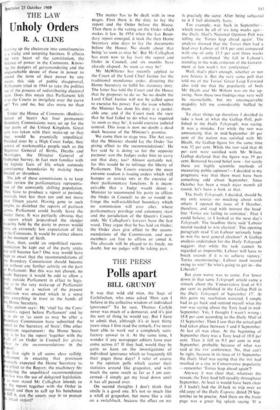THE LAW
Unholy Orders
R. A. CLINE
Calling up the electorate into constituencies is a tricky and tempting business. It affects the very heart of the constitution, the balance of power in the Commons. Know- ing the dangers of gerrymandering and the unquenchable desire of those in power to extend the term of their power by any means this side of public disapproval, Parliament tried in 1944 to take the politics out of the process of redistributing electoral ,eats. Does this mean that Parliament left it to the Courts to invigilate over the carve up? Yes and no, but alas more no than ■ ,es.
Under the House of Commons (Redistri- bution of Seats) Act four permanent
Boundary Commissions were set up for the four parts of the United Kingdom. Great care was taken with their make-up so that they would be essentially unpolitical.
Presided over by a High Court Judge, they consist of workmanlike people such as the Registrar General of Births, Deaths and Marriages, the Director General of Ordnance Survey, in fact men familiar with the logistic facts of life which outmode constituency boundaries by making them bloated or shrunken.
The job of these commissions is to keep under review the parliamentary representa-
tion of the constantly shifting population.
They have to produce a report at periodic intervals (not less than ten and not more than fifteen years). Having gone to such lengths to disinfect the reports of partisan germs, Parliament could hardly leave the matter there. It was perfectly obvious that .1 report which jeopardised the slensler lajority held by the party in power would- have an extremely low expectation of life in the Commons. It would be extinct almost tithe moment of birth.
How, then, could an unpolitical recom- endation be kept out of the party arena
ut still become law? One way would have
een to enact that the recommendations of he Boundary Commission should become
.o‘ without any further activity on the part
it Parliament. But this was not chosen, no oubt because it would be odd to allow a ody outside Parliament in effect to legii,s-
ite as to the very make-up of Parliament self. And so a section of the present gislation was enacted" which in a sense uts everything in trust to the hands of he Home Secretary.
The section says: He 'shall lay the Corn- 'Scion's report before Parliament' and he
to do so 'as soon as may be after a oundary Commission have submitted the eport to the Secretary of State'. One other nportant requirement: the Home Secre-
r is to lay the report 'together with the aft of an Order in Council for giving fleet to the recommendations in the epore.
At first sight it all seems clear sailitit trliament in enacting that provision viously expected the Home Secretary to ‘e effect to the Report; the machinery for Instating the unpolitical recommendation to law was the use of delegated legislation. as now stated Mr Callaghan intends to the report together with the Order in uncil and then to call up his henchmen kill it, can the courts step in to protect intact report?
The matter has to be dealt ss ith in two stages. First there is the duty to lay the report and the Order before the House. Then there is the voting on the Order which makes it law. In 1954 when the last Boun- dary report emerged, it took the then Home Secretary nine days to lay the documents before the House. No doubt about that being 'as soon as may be'. But Mr Callaghan has even now to lay both the report and Order in Council, and six months have already elapsed. As soon as may be?
Mr McWhirter has recently applied to the Court of the Lord Chief Justice for the traditional mandamus order, directing the Home Secretary to fulfil his statutory duty. The latter has told the Court and the House that he proposes to do so. So no doubt the Lord Chief Justice will not be called upon to exercise his power. For the issue whether the Minister has done his duty is a justici- able one, and if the Court took the view that he had failed to do what was required 'as soon as may be', it could exercise judicial control. This issue is now no doubt a dead duck because of the Minister's promise.
We come then to stage two. The Act says that the Minister should lay the Order 'for giving effect to the recommendations'. He has said he is doing so for the opposite purpose: can the Judges order him to carry out that duty, too? Almost certainly not, for this would be to infringe the liberty of Parliament. The Courts exercise the most extreme caution is issuing orders which will hamper or restrict Nies in the exercise of their parliamentary functions. It is incon- ceivable that a Judge would direct a Minister to recommend his party to affirm the Order in Council: to do so would in- fringe the well-established boundary which no commission will ever alter, where parliamentary privilege and autonomy start and the jurisdiction of the Queen's Courts ends. Mr Callaghan's lawyers have the last word. They argue that he has laid an Order; the Order does give effect to the recom- mendations of the Commission, and now members are free to affirm or annul it. The charade will be played to its finale, no doubt, but no judges will be taking part.


















































 Previous page
Previous page